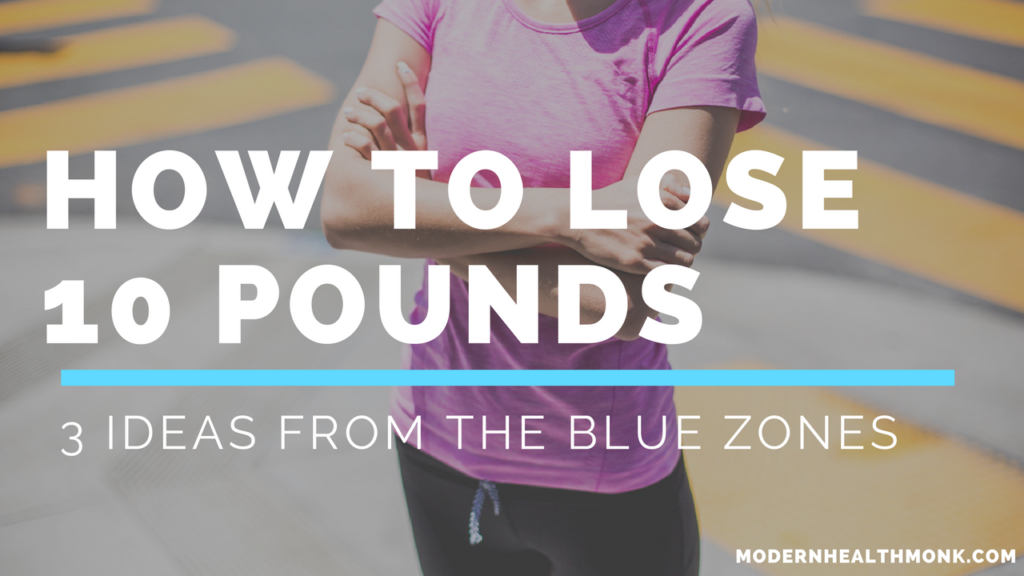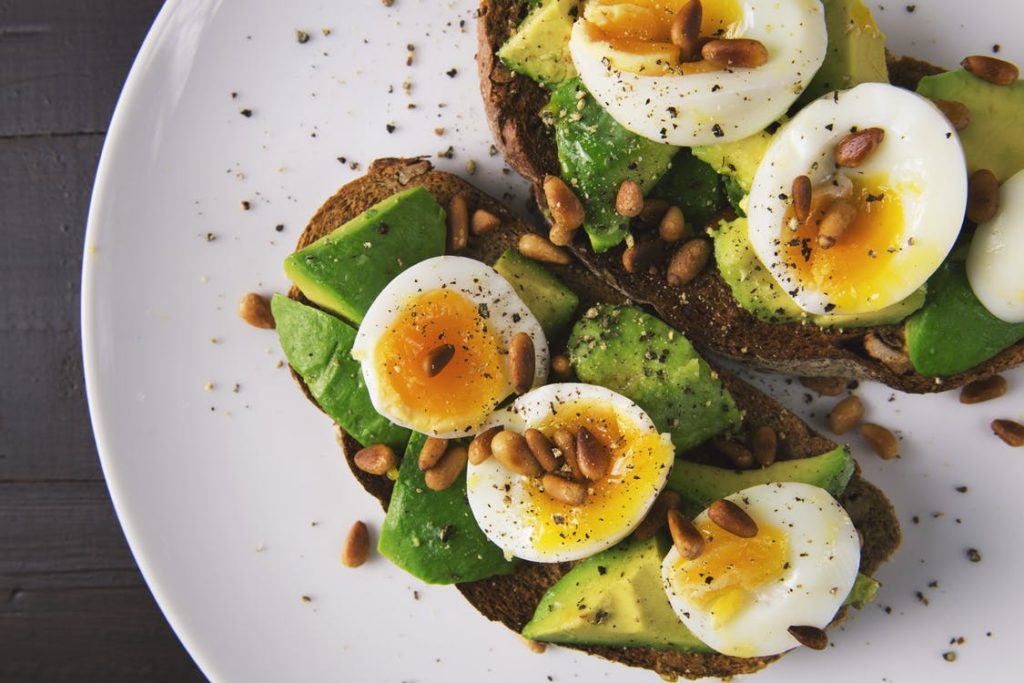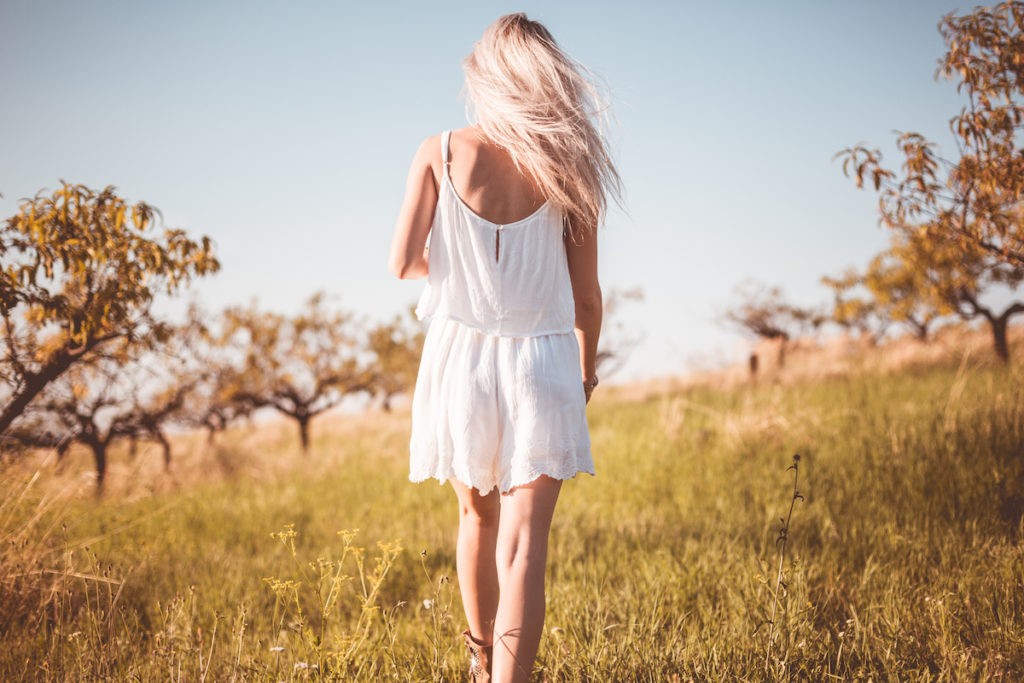
How to Lose 10 Pounds: 3 Unconventional Ideas From the Blue Zones

How to Lose 10 Pounds – Ideas From the Blue Zones
I go to one of the biggest schools of natural medicine in the world.
And unfortunately, an interesting phenomenon takes place.
In a school with so many health-conscious people, there is an abnormal amount of crazy, ridiculous, restrictive diets, which is ironic.
In fact, the NYtimes recently talked about Orthorexia as “social media’s clean eating disorder.”
Well, if you want to lose weight, isn’t “eating clean” the way to go?
Not necessarily.
How to Lose 10 Pounds: First – Avoid Orthorexia

Orthorexia is this idea that, by over-focusing on a person’s diet, we’re actually causing more harm than good.
There seems to be a disturbing trend where people believe the following:
that if you eat anything other than kale, quinoa, coconut oil, and other super foods, you will not live a long and healthy life.
Or that you’re going to get cancer.
That conventional things—a drop of alcohol, chips every once in a while, wheat bread—are going to kill you.
I recently found out that orthorexia is classified as an eating disorder – and yes, it can kill you. The irony is that of the many nutrition advocates and students I’ve met, many of them live in a state of extremes – where one day, eating a piece of bread could kill them or constipate them for a week.
It’s almost scary considering the fact that none of my ancestors had any problem eating bread every day. They had no problem eating junk every once in a while. And my great-grandma lived to be in her late 90s, much longer than almost every doctor in the United States will live to be.
Second – Ask Yourself – When Did Healthy Eating Actually Become So Complicated?
Has it ever been difficult to figure out what to eat in human history before the modern era?
I think it’s so interesting how animals instinctively know their natural diet. They eat as much as they want, whenever they want, and they have no problems with diabetes if they are in the wild.
They have no problems with health conditions that magically start showing up when they’re fed a different or more conventional diet.
The indigenous people know the exact same thing. Follow the indigenous diet and you’re (most likely) not going to have any real problems with your health or disease.
The blue zone cultures follow a natural diet. They aren’t “going hard” in the gym every day doing bootcamps or lifting weights. They just spend time with their family, and they’re happy. They don’t go low-carb either.
They do a lot of low-level exercise and they live to be over 100 in percentages and proportions that are unheard of here in the West.
So that begins to make you wonder: When did eating healthy become so complicated?
Is it really about never having a slice of bread, or chips, or never having alcohol at all?
Is being healthy and living a long life more complicated than just your diet?
What if Being “Healthy” is More About How You Live Your Life?

I find that in America, there is an overemphasis on what people eat as far as “health” goes.
Look at Europe; look at how they live. High fat, lots of wine, having an espresso and pastry for breakfast—it’s the French Paradox, with their fat content consumption. Despite the supposed “sins” of their diet, they often outlive Americans with a better quality of life, too.
And they’re far less neurotic about it.
Another interesting idea is that your grandma probably knew how to eat properly. Most of our elder generation knew how to eat whatever their “indigenous” diet was.
In my case, my family on my mom’s side is from Lithuania and Poland, and on my dad’s side, from Haiti. In each of those respective cultures they knew exactly what food was considered healthy, natural, and native to their diet.
My great grandma on my mom’s side lived to be in her late 90s, and I knew her the entire time, my whole childhood.
The most ironic part?
She wasn’t taking protein, spirulina, or kale shakes. There’s no concept of a superfood. She also didn’t deprive herself of bread or gluten. In fact, that was often a staple food.
They usually ate a lot of carbs at each meal, with some meat and vegetables. Carbs were the staple food. And no one seemed to get upset about the carb count in their diet.
And they lived well—even longer (and better) than our generation. Interesting, eh?
What We Can Learn From the Incredible “Blue Zones”
Is a nutritionist who only eats three kinds of foods a healthy person (because he she has “food restrictions?”) Do they have a healthy mindset that they can share with their patients and clients one day?
I don’t know. I don’t think that is the case.
Think about how people live in the blue zones. The blue zones are regions of the world which include Costa Rica, Japan, Italy, and Greece. People from the blue zones live to be over 100 years old—in much greater percentages than anywhere else in the world.
The thing about people from the blue zones is that they do not only eat healthy. The researchers studying these people have concluded that the reason why they live so well, and so long, at every stage of their lives is not just because of their diet.
It’s because of their overall way of living. Lots of regular low-level exercise. A family-centered culture. They often have faith in their lives. They have a reason for getting up in the morning. It’s culture, family, and people-centered living.

And so the diet is just a very small piece. An important piece, but it’s still a small piece. The problem is if we just focus on that, we’re missing the bigger picture.
This is similar to the research on heart disease being linked with Type A behavior. The link between “Type A” behavior and coronary events was noticed by cardiologists Meyer Friedmen and Ray Rosenman in the 1950s.
They found that people with a certain cluster of personality traits, developed heart disease at much higher rates, even if they ate healthy. Many of them died of heart attacks because of the way they lived.
With this, I see that there’s an overemphasis on diet in the United States and an underemphasis on the way we ought to live.
Focusing On the Way You Want to Live
We experience so much stress in our daily lives. Imagine what hating your life every day for years and years can do internally?
Being happy in your relationships, doing work you love, eating right, just the feeling of enjoying your life—these are the things that we should be shooting for.
There needs to be a revolution of people that focus on the way we live, rather than an orthorexic culture obsessed with just food. For me, part of reinventing myself is doing work like this—writing books and shooting videos. I feel healthier when I wake up and do work I love.
Even when I eat right, I feel ill if I have to do 10 hours of work that I hate. Of course, diet is important. Is our ridiculous obsession with gluten-free bread really what will save us?
I don’t know.
I heavily question that.
Maybe you’ll be able to cut yourself some slack after reading this, so you don’t feel like you have to be neurotic about the freakin’ kale shake every morning.
Maybe you’ll feel like you can finally breathe a sigh of relief, and just have some bread with butter one day, and not beat yourself up about it.
You’ll be fine.
Do you have a friend that you think is orthorexic? If you’ve confronted him or her, what do they say?
-Alex
